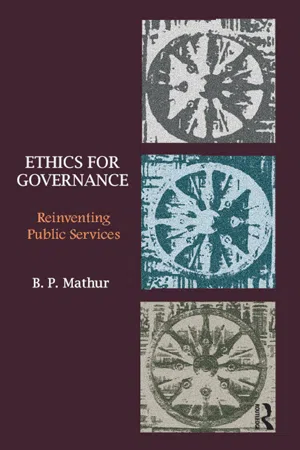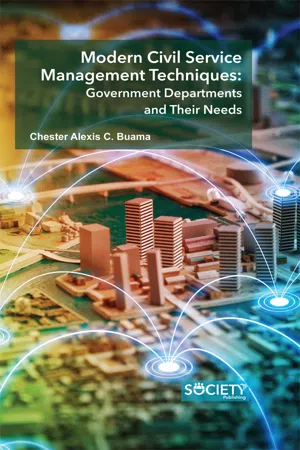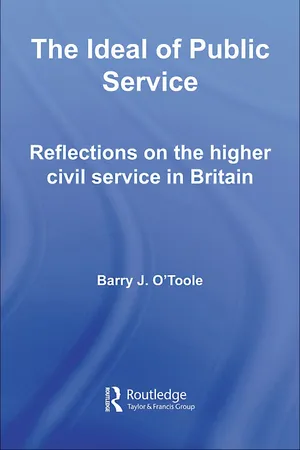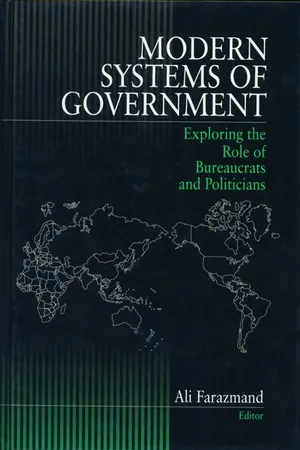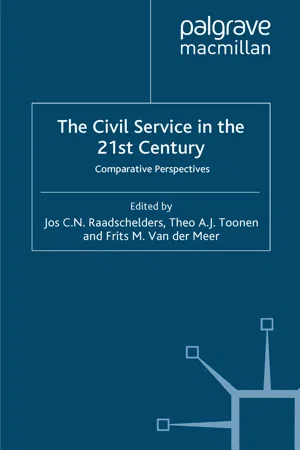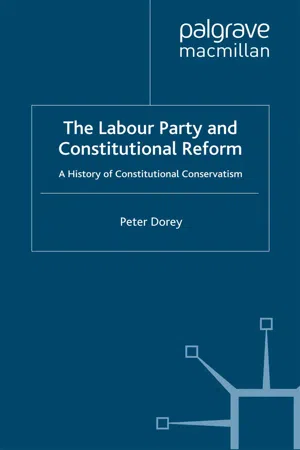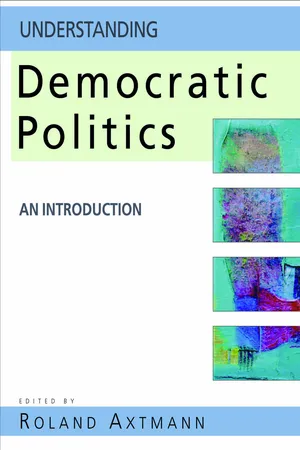Politics & International Relations
Civil Service
The civil service refers to the body of government employees who are responsible for implementing and administering public policies and programs. Civil servants are typically non-elected officials who work in various government agencies and departments. They are expected to be politically neutral and provide continuity in governance regardless of changes in political leadership.
Written by Perlego with AI-assistance
Related key terms
1 of 5
10 Key excerpts on "Civil Service"
- eBook - PDF
- Jolanta Itrich-Drabarek, Stanislaw Mazur, Justyna Wisniewska-Grzelak(Authors)
- 2018(Publication Date)
- Peter Lang Group(Publisher)
The question of the linkage between politics and administration is especially important, and also especially vexing, in democratic political systems. On the one hand the rule of law concepts of fairness, and the need for credible commitment to law and precedent makes the neutral Civil Service especially valuable. On the other hand, however, political leaders will argue that they have a mandate from their election to make and implement certain types of policy, and that mandate should not be thwarted in any way by a permanent and unelected Civil Service. A number of answers have been proposed for this question, but it remains at the heart of democratic public administration. The Civil Service and Political Influence 15 There are a variety of ways in which a Civil Service may be made to be more attuned politically, and more committed to the goals of the government of the day. Even if a Civil Service is permanent and professional, political leaders may still attempt to influence them to follow the policy templates of the government. But the principal means of the political leaders have used to influence public adminis- tration is to appoint their own personnel into positions in the bureaucracy. There are political appointees in all political systems, and the question is how many political appointees there are, and what positions do they occupy. The majority of this paper will therefore address the role of political patronage in bureaucracies and the consequences of that patronage. Patronage, Politicization and Commitment The remainder of this paper will focus on patronage, politicization and other forms of relationship between political leaders and public servants. There is a ten- dency to discuss all forms of patronage and politicization as the same, but there are marked differences in the manner in which the two sets of actors–politicians and bureaucrats–interact in the process of governing. - eBook - ePub
Ethics for Governance
Reinventing Public Services
- B. P. Mathur(Author)
- 2015(Publication Date)
- Routledge India(Publisher)
Britain had a rudimentary Civil Service at the beginning of 19th century, but towards the last quarter of the century it established an efficient well-oiled Civil Service. Two factors contributed to it. First was the development of trained Civil Service in German states and the bureaucracy created in France particularly by Napoleon from which it drew inspiration. Second, the Northcote–Trevelyan report (1853) which emphasised the need of establishing administration on the foundation of trained and efficient Civil Service and recruitment through competitive examination with the highest description of education in the country as provided by Oxford and Cambridge. Northcote–Trevelyan report was greatly influenced by the British experience of the East India Company and Macaulay’s spirited championing that candidates for service in India he recruited through examination and should possess high degree of intellectual competence. In 1870, Gladstone, having decided on the introduction of Income Tax, felt the need of an effective administration and established the system of competitive examination for Civil Services. It was through the examination system that the officers of ICS came and ruled India with firm grip and gave a reasonably effective administration.In Britain, historically the Parliament always looked at executive officers as King’s servants and, therefore, with suspicion. But, over the years, the British Civil Service grew in public esteem. Post the First World War, the State depended on its success on a trained and efficient Civil Service which could advise the political chiefs in formulating effective policies from vague ideas and carry them out loyally. The top civil servants, thus, became more and more associates rather than the executive instruments of the political leaders. The rise of welfare state after the Second World War and the technological revolution and global competitive forces posed new challenges to the administration. The Fulton Committee (1968) appointed by Harold Wilson, recognised the importance of professionals — he felt they should have parity of esteem with the generalist, and recommended abolition of classes and a unified grading structure. The truly dramatic changes were brought about by Margaret Thatcher. Its main elements were rolling back the State, providing value-for-money for taxpayers, making use of best private-sector experience and introducing management and efficiency into government. Competition was also introduced in the Civil Services and it was downsized. The Civil Services received a big jolt. As a commentator put it, ‘[f]or a while the whole Whitehall system almost visibly juddered … It was a culture shock’.6 However, the key principles on which the British Civil Service was based remained intact: integrity, political impartiality, objectivity, selection, and promotion on merit and accountability through ministers to Parliament.Senior Civil Service in developed countries
Most advanced countries in recent years have created a Senior Civil Service (SCS) as part of the public service reform process. The idea is to select the very best of the society for the most challenging tasks in the government at senior level and form them into a unified and cohesive group responsible for higher level policy advice, managerial and professional responsibilities. OECD says: - Chester Alexis C. Buama(Author)
- 2020(Publication Date)
- Society Publishing(Publisher)
Meanwhile, the factionalism that negatively impacts the reputation of the institution continues to prosper (Olken and Pande, 2011). Some governments try to satisfy all the factions by giving them jobs in the Civil Service (Nica, 2015). The result is a bloated institution that is a burden on the taxpayer without actually delivering the much-needed public services (Peters and Pierre, 2004). If there has to be changed in the Civil Service, then it has to be a Modern Civil Service Management Techniques: Government Departments and their Needs 122 systemic one that includes the norms and values of the society as a whole (Caplan, 1988). Whereas politicians have a role to play in terms of providing direction to the Civil Service, they ought to be somewhat detached from the actual implementation of policy (Mbabazi and Pyeong, 2014). The work of the Civil Service is a professional endeavor that requires expertise and dedication (Bekke and Meer, 2000). It is not something that can easily be constructed from inexperience and assumptions about what is needed for the institution (Grindle and Hilderbrand, 1995). The Civil Service must also be honest with the community about what it can realistically achieve within the context and subject to the resource restrictions that it faces (Halligan, 2004). Far too often, the Civil Service is perceived to be a solution to all the problems that the community is facing when in reality it can only solve very few of them (Caplan, 1988). There is a rural-urban divide within the Civil Service with the workers that are residents in the villages finding it hard to continue working in the Civil Service because of the poor facilitation (Bekke and Meer, 2000). Those in the city are relatively well off because they have access to the urban amenities and are also given certain allowances to compensate for the cost of living differentials (Peters and Pierre, 2004).- eBook - ePub
The Ideal of Public Service
Reflections on the Higher Civil Service in Britain
- Barry O'Toole(Author)
- 2006(Publication Date)
- Routledge(Publisher)
5 The ideal of public service Some reflections on the higher Civil Service in BritainSenior civil servants in Britain are part of our political elite. Their status was developed over the decades following the Northcote–Trevelyan Report, and they came to play an increasingly important part in the government of the country. Indeed, they were the handmaidens of ministers. They were guided in their activities by an ideal of public service inspired by the great idealist philosophers, from Plato and Aristotle to Jean-Jacques Rousseau and Thomas Hill Green. That ideal was essentially that there is such a thing as the public interest or common good, that the purpose of government is to ensure the preservation of that common good, and that those fortunate enough to have been endowed with certain intellectual capacities should set aside their own and their group interests for that purpose. Some regard this as being anti-democratic, even with totalitarian undertones, and question whether senior officials should arrogate to themselves the right to determine what the public interest is or even to think in such terms. Such critics are, of course, correct that in a democracy it is elected officials, not civil servants, who are responsible for such matters, for it is they, and only they, who are accountable to the electorate for the decisions of government. The views of political philosophers cannot be accepted absolutely as the basis for practical action in government. Questions may indeed be raised about the necessity in a democracy for appointed officials to pursue the settled will of the electorate as expressed through the ballot box. Civil servants’ ideas of the public interest have to be reconciled with the intentions of elected politicians. In other words, the necessity for accountability is also central to the notion of an ethic of public service. However, the necessity for accountability in a formal, democratic sense, does not negate the requirement for moral accountability and for public officials to act in ways which accord with such requirements. Examples from history indicate that sometimes public officials ought to exercise independent moral judgement; and the inculcation of such an independent spirit, a spirit inspired by the ideal of public service outlined in Chapter 1 - eBook - PDF
Modern Systems of Government
Exploring the Role of Bureaucrats and Politicians
- Ali Farazmand(Author)
- 1997(Publication Date)
- SAGE Publications, Inc(Publisher)
Any document going before a minister is likely to be drafted and redrafted several times or, at any rate, covered by a memo from a senior official that summarizes the key points. There is a recognizable style for civil servants to follow: always clear, concise, unemotional, and well argued. Overtly political points are taboo; they are more likely to be couched in terms of attracting credit for the policy, achieving the government's objectives, and so on. Not a surprise, civil servants learn to keep their own political feelings deeply submerged and indeed suppressed. This is perfectly reasonable because quite often they are called upon, like civil servants in other democracies, to find ways of fulfilling policies to which they privately do not necessarily subscribe. It is important to recognize that the Civil Service in Britain is also nonexecutant in a number of important areas of work. That is, it does not deliver programs directly but relies on local authorities, the National Health Service, the remaining nationalized industries, or professional bodies such as the police to implement government policies. It is sometimes frustrating for politicians coming into office to find that many of the goals they set themselves are not actually within the competence of civil servants to deliver. Civil servants, who have understood their limitations in this regard long ago, have tended to turn it into a virtue: The skills they traditionally value are those of analysis and appraisal of options together with judicious defense of the status quo rather than executive action. The instruments they could offer ministers, aside from legislation (with its attendant sanctions for noncompliance), were persuasion, incentivization, demonstration by example, and sometimes, with Treasury and parliamen-tary approval, selective allocation of new expenditures. - eBook - PDF
The Civil Service in the 21st Century
Comparative Perspectives
- J. Raadschelders, T. Toonen, F. Van der Meer, J. Raadschelders, T. Toonen, F. Van der Meer, Kenneth A. Loparo, Frits M. Van der Meer(Authors)
- 2007(Publication Date)
- Palgrave Macmillan(Publisher)
The changes in politics and government since that time, however, have made these ideas about change all the more germane. In the first place, the reforms in public administration associated with NPM have tended to devalue, or more commonly to ignore, the constitutional position and legal position of the Civil Service system (Suleiman, 2003). The career Civil Service has been denigrated in favour of a model of generic management, a view within which civil servants are not partners in the management of the state but rather are often seen as impediments to the efficient man- agement of the public sector (Hood, 1990; 2001; but see Du Gay, 2000). Crisis and change Contemporary political events also have produced a disjuncture between the reality of administration and conventional formal state- ments about the role of the Civil Service in many countries. In 232 The Civil Service in the 21st Century particular, the termination of socialist systems in Central and Eastern European countries resulted in a clear distinction between the inher- ited system of administration and the assumed role for administration in democratic political systems (see Coombes and Verheijen, 1998). This disjuncture has been become all the more apparent as the major- ity of these countries have applied for membership in the European Union and their ability to administer the acquis in an effective and responsible manner becomes an issue in the accession debates. Demo- cratic transformations in Asia and Latin America have produced other marked disparities between the reality and the stated principles of administration (see Burns and Bowornwathana, 2001). Also, adminis- trative systems in nearly all countries have faced a major challenge in the post-9/11 struggle to combat terrorism. - eBook - PDF
The Labour Party and Constitutional Reform
A History of Constitutional Conservatism
- P. Dorey(Author)
- 2008(Publication Date)
- Palgrave Macmillan(Publisher)
Labour’s evidence also criticized the Civil Service’s continued reverence for the generalist administrator over the specialist adviser. All of these characteristics were deemed to militate against the role which the Civil Service was now expected to fulfil, namely ‘the business of managing a highly complex techno-industrial society’, and as such, concern was expressed that ‘the Civil Service is not adapting itself quickly enough to perform its new tasks as efficiently as it might.’ Ultimately, it was argued that ‘the problem essentially is that as the business of Governments has extended outwards, and departments have swollen, the Minster has become stretched’ to the extent that there was now a clear need ‘to strengthen the Minister, the “temporary politician’’ in his department, in relation to the “permanent politicians’’, his civil servants’ (Labour Party Archives, Re.37/September 1966; Labour Party Archives, Re.63/December 1966). To rectify these alleged deficiencies, the Labour Party suggested 22 specific proposals to the Fulton Committee (Labour Party Archives, Re.63/December 1966), namely, • Steps should be taken to develop a more powerful concept of public service, and a civil servant who is more professional, adaptive and creative. • There must be more personal involvement in the execution of policy, or negotiation on the public’s behalf with private interests. • The civil servant should be better integrated both with his col- leagues performing different functions in his department, and with people working in fields related to his outside. The Civil Service 159 • That the formal division between the executive, administrative and professional classes of the Service should be abolished. • That graduate entrants to the non-professional Civil Service should enter at a single level, and undergo a common course of initial training. - eBook - PDF
Understanding Democratic Politics
An Introduction
- Roland Axtmann(Author)
- 2003(Publication Date)
- SAGE Publications Ltd(Publisher)
12 Government, Civil Service and Public Policies Grant Jordan and Emma Clarence A simplistic image of public policy envisages governments deciding what a policy should be and civil servants implementing that policy – or at least that is how the policy-making process may appear judged by polit-ical and parliamentary conventions. How-ever, the reality of public policy is far more complex than this image allows. The relation-ships between governments, the Civil Service and the public policy-making process need to be examined in order to make sense of how policy is made and implemented. Following on from this, it is possible to explore the important changes that have occurred in how governments govern and how those changes have impacted upon citizens. Specifically, accountability – or the ability to hold some-one to account for the actions done in his or her name – has been altered by the changes in the relationship between governments and the Civil Service. This has profound implica-tions for the ways in which individuals can interact with governments. While this chap-ter draws widely on British examples, its key themes are ones that have a resonance for many other western countries. PUBLIC POLICY-MAKING Broadly, public policy is the term given to the decisions and direction of a government as well as the ideas which lead to actions to achieve certain aims and objectives. How that policy is made is important to consider. Gov-ernments alone do not make policy. Practic-ally, policy-making is a complex process in which a multiplicity of actors can have a role. The government, the Civil Service, interest groups, ‘think tanks’, the media and ‘popular opinion’ among others can all influence policy-making. Briefly, the policy process can be divided into four stages: policy initiation, formula-tion, implementation and evaluation. The policy initiation stage is where issues are identified as needing to be addressed by gov-ernment. - eBook - PDF
From the Active to the Enabling State
The Changing Role of Top Officials in European Nations
- E. Page, V. Wright, E. Page, V. Wright(Authors)
- 2006(Publication Date)
- Palgrave Macmillan(Publisher)
We will end with a short assessment of the evolving role of the Greek senior civil servants. We have conducted empirical research on these topics in Athens, using anonymous interviews with top civil servants and consulting the relevant legislation, statistical data sources, and expert reports. The historical and political context of the Greek Civil Service Any discussion of the role, the power and the autonomy of Greek civil ser- vants should start with the historical and political context of the develop- ment of the state and particularly the central public administration (for a short account of the Greek central public administration and its Civil Service in English, see Sotiropoulos 1999). Greek administration has shown all the characteristics of the Weberian ideal-type of bureaucracy as well as the pathological symptoms associated with the functioning of modern large- scale organizations – goal displacement, red-tape, waste, favouritism and corruption. In addition, Greek bureaucracy has an excess of multiple, latent, albeit pervasive, informal relations among bureaucrats working in various parts of central and regional administration. Such relations also link bureaucrats and citizens, and, above all, bureaucrats and politicians. These informal relations have grown on the fertile soil of patronage net- works created among voters, political parties and state institutions since the early nineteenth century (for an historical-sociological analysis of patron- age relations in Greece see Mouzelis 1978a; Tsoucalas 1978). Generally, the central role of the state in the development of industrial- izing societies has been recognized by research on comparative economic Role of the Greek Senior Civil Service 17 18 From the Active to the Enabling State development (see Gerschenkron 1962). - eBook - PDF
- Joseph Erigina McLean, Joseph McLean(Authors)
- 2017(Publication Date)
- Princeton University Press(Publisher)
It is, I think, pertinent at this point to look at the substance of the generalist function in modern government, apart from the previously discussed qualifications of the administrative officer. The Association of First Division Civil Servants sub- mitted a statement to the British Royal Commission on the Civil Service in 1931 which summarizes the matter with great clarity from the British standpoint: "The business of government, if it is to be well done, calls SH An Administrative Classf for the steady application of long and wide views to complex problems; for the pursuit, as regards each and every subject matter, of definite lines of action, mutually consistent, con- formed to public opinion and capable of being followed continuously while conditions so permit and of being readily adjusted when they do not. Almost any administrative decision may be expected to have consequences which will endure or emerge long after the period of office of the Government by which or under whose authority it is taken. It is the special function of the Civil Service and the special duty of the adminis- trative class of that service in their day-to-day work to set these wider and more enduring considerations against the exigencies of the moment, in order that the Parliamentary convenience of today may not become the Parliamentary embarrassment of tomorrow. . . . Vacillation, uncertainty, and inconsistency are conspicuous symptoms of bad administration. . . . "Thus the efficient performance of the administrative work of the various departments calls in all cases for a trained men- tal equipment of high order, while in the particular case pow- ers developed in some particular direction are needed.
Index pages curate the most relevant extracts from our library of academic textbooks. They’ve been created using an in-house natural language model (NLM), each adding context and meaning to key research topics.

